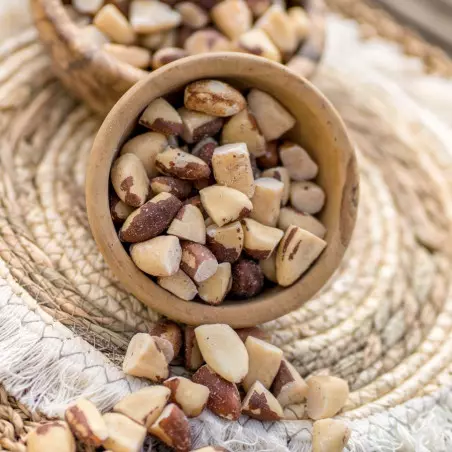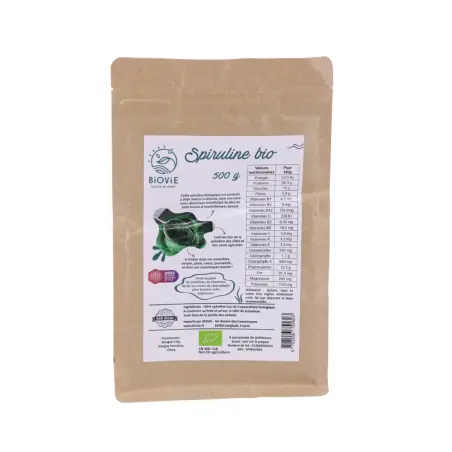The pregnancy period is a time when there is everything to gain from having a healthy diet.
It is often an opportunity for the expectant mother to make some dietary changes, and sometimes even for the whole family.
But between the restrictions and the recommendations of all kinds, we are sometimes a bit lost. perdu.e..
What diet is recommended during pregnancy ?
Generally, during pregnancy, it is recommended to have a healthy and balanced diet.
The ideal diet for a pregnant woman, as for everyone, could be defined as a varied diet, consisting of foods served in a state as close as possible to their natural state.
This is also true even if one is not pregnant !
Of course, it will be essential to personalize and adapt the recommendations according to the terrain, temperament, tolerances, possible deficiencies, etc.
Overall, it is not at all necessary to "eat for two." A moderate increase in food intake is quite sufficient: Eat twice as well but not twice as much !
The official recommendations vary, but it can generally be noted that it is recommended to have a "balanced and varied diet" during pregnancy.
Some recommendations will focus on specific needs or certain vitamins.
Let's remember that in natural health, we will seek to meet the needs for vitamins and minerals primarily with living foods.
These recommendations should ideally be applied before conception in order to address any potential deficiencies and to ensure good mineral reserves from the beginning of pregnancy.
The implementation of pre-conception support is ideal for taking preventive action upstream.
Why is a raw food diet interesting during pregnancy ?
Living food will therefore have many benefits during pregnancy:
- rich in nutrients, vitamins, and minerals useful for the future baby as well as for the mother,
- easy to digest, if one is used to it. A dish of raw fruits and vegetables is lighter than a dish of grains and proteins
- During pregnancy, the stomach and digestive system will have to make do with a smaller space because the baby takes up room! A diet of raw foods is perfectly suited to small, frequent meals.
- Cooking alters the nutritional quality of food, particularly vitamins and enzymes. Eating raw, plant-based, and living foods helps to increase the nutritional quality of meals.
- Plants, oilseeds, sprouted seeds, algae, lacto-fermented foods... all these foods are full of the nutrients necessary for the proper growth of the fetus and the overall health of the mother.
Some plants and superfoods have a very high content of vitamins B, C, A, D, iron, zinc, selenium, calcium, magnesium, potassium...
If you feel like trying but are not yet accustomed, gradually incorporate more raw foods:
- eat more fruits
- eat a bowl of raw vegetables at each meal
- gradually integrate the seaweed "and the" lacto-fermented foodsIt seems like your message is incomplete. Could you please provide the text you would like translated from French to English?
- No dogma, follow your intuition and seek guidance from a natural health professional specialized in pregnancy.
In general, a raw food diet provides energy and vitality. It is a physiological diet suited to human beings and therefore well-suited for pregnancy.
Certain precautions will need to be taken if one is not at all used to eating raw food and has a very fragile and damaged digestive system.
Apart from these specific cases, all pregnant women will benefit from increasing the proportion of fresh fruits and vegetables in their meals.
The recommendations of all kinds from your loved ones, parents, friends, and healthcare professionals will be varied and may sometimes unsettle you...
Inform yourself, read, experiment, keep your critical thinking, seek guidance, and make your choices in an informed manner.
There is no absolute truth, there is your experience and the path you wish to take...
Trust yourself.
What foods should be prioritized during pregnancy ?
Generally, we will try to prioritize a healthy and nutrient-rich diet.
One could say that ideally, we will try to prioritize consuming foods as close to their natural state as possible.
By natural diet, we mean a diet that is as unprocessed as possible.
There is no food to ban, except in special cases; you just need to use common sense.
It seems like your message got cut off. Could you please provide the complete text you would like translated from French to English? Will avoid:
- stimulants: alcohol, tobacco, drugs,
- industrial and processed foods, often rich in flavor enhancers, food additives, high in sugars and salt,
- foods that are heavily cooked and difficult to digest during this period: fried foods, chips, food mixtures...
- endocrine disruptors, which can have a significant impact on the health of the future baby. Pesticides and colorants should be avoided, and special attention should be paid to cooking and storage materials.
It seems like your message got cut off. Could you please provide the complete text you would like translated from French to English? will prioritize healthy foods:
- whole, unrefined foods that have undergone minimal processing and retain most of their original nutrients,
- fresh fruits: choose fruits that appeal to you and don't hesitate to discover and taste new fruits at the market or store: orange, grapefruit, banana, apple, pear, peach, cherry, strawberry, blueberry, raspberry, apricot, persimmon, pomegranate, kiwi, pineapple, papaya, cherimoya, passion fruit... choose according to the season and the availability on the stalls.
- dried or freeze-dried fruits that are full of flavor, easy to store and transport: date, fig, apricot, raisin, pineapple, , mango, apple, pear, strawberry, banana, khaki, durianIt seems like your message is incomplete. Could you please provide the text you would like translated from French to English?
- nuts and seeds rich in quality lipids: nuts, almond, hazelnut, cashew, , Brazil nut, pecan nuts, sunflower, pumpkin seeds, sesame, hemp... of course, we will choose raw and not roasted, salted oilseeds.
- vegetables: in the form of juice, in salads, in raw preparations, and possibly lightly steamed.
One might also consider "superfoods" that will provide numerous nutrients during this period:
- seaweed and seawater,
- sprouted seeds, true nutritional powerhouses,
- lacto-fermented foods, beneficial for the mother's microbiome and therefore for the future baby,
- the spirulina, a true concentrate of minerals,
- the pollen, which are full of amino acids,
- the blend of oils suitable for future mothers,
- "the"barley grass "and the"wheatgrassIt seems like your message is incomplete. Could you please provide the text you would like translated from French to English?
These nutritional powerhouses are valuable allies throughout the entire pregnancy. They provide a large number of nutrients and are easy to digest.
Colorful and original, they bring new flavors and new culinary possibilities, and are valuable natural additions to incorporate into your meals.
If you suffer from nausea, these concentrated foods are very useful to ensure you consume vitamins and minerals, even when eating small amounts.
To drink !
For your drinks, opt for low-mineral water, herbal teas suited to your current needs, vegetable juices...
Avoid stimulating drinks such as tea, coffee, or alcohol.
No dogmaIt seems like your message is incomplete. Could you please provide the text you would like translated from French to English?
Generally speaking, follow your feelings and listen to yourself to choose the foods that are right for you.
Make changes little by little, and if you are not used to eating a lot of raw food, gradually add vegetable juices and a large bowl of raw vegetables as a starter to each meal.
Some suggestions for raw food meals during pregnancy
Snacks
Always have a small jar with dried fruits and nuts for snacks and nibbles.
It's a habit that will be useful to you in a few months when your toddler gets hungry during a walk !
A bag or jar filled with dates and almonds or raisins and hazelnuts, for example.
Fruit breakfast
Chia porridge It seems like your message is incomplete. Could you please provide the text you would like translated from French to English?
The day before, soak 1 tablespoon of chia seeds in 1/2 glass of water.
In the morning, add fresh seasonal fruits, dried fruits, nuts, sprinkle with a tablespoon of pollen, and enjoy mindfully !
Chia promotes intestinal transit, which is often disrupted during pregnancy.
Popeye smoothie Sure, please provide the text you would like to be translated from French to English.
Mix 1 banana, 2 pears, 1 handful of spinach, and 1 teaspoon of spirulina. Add vanilla and a bit of water if desired.
Convenient to take away in a jar with a straw.
If you suffer from constipation, add a small spoonful of psyllium and enjoy this preparation with a spoon.
Complete meal
A complete and colorful plate Sure, please provide the text you would like to be translated from French to English.
For your main meal, make a plate with a large portion of raw vegetables of your choice (salad, carrot sticks, cucumber slices, grated red beets, a piece of avocado...), a portion of steamed vegetables if you wish, add a handful of sprouted seeds, a spoonful of seaweed tartare, some nuts, a few olives...
Drizzle with a teaspoon of olive oil and a teaspoon of hemp oil, or the special mom's oil blend, a bit of lemon juice, and sprinkle with a tablespoon of nutritional yeast.
This dish, rich in flavors, rich in colors, and full of nutrients, can be adapted to your tastes and should delight everyone !
To summarize,
- Eating plant-based, fresh, and varied foods
- Favor simple foods that grow in the ground and on trees !
- Add natural "superfoods"
- Get support from a naturopath specialized in pregnancy care to personalize these recommendations.


















